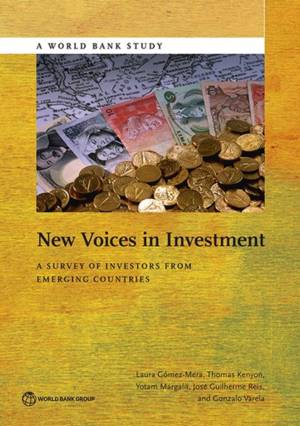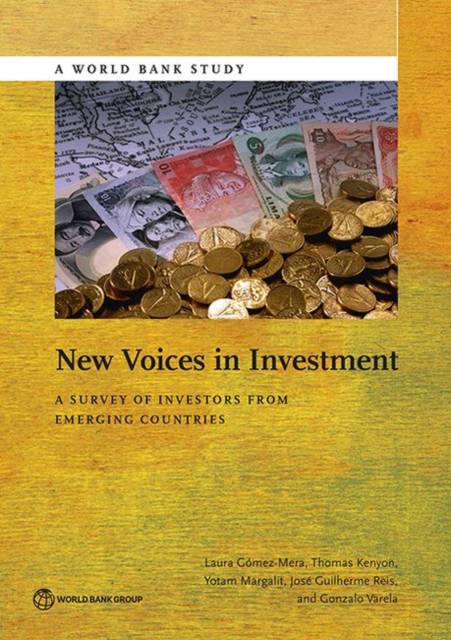
En raison d'une grêve chez bpost, votre commande pourrait être retardée. Vous avez besoin d’un livre rapidement ? Nos magasins vous accueillent à bras ouverts !
- Retrait gratuit dans votre magasin Club
- 7.000.000 titres dans notre catalogue
- Payer en toute sécurité
- Toujours un magasin près de chez vous
En raison de la grêve chez bpost, votre commande pourrait être retardée. Vous avez besoin d’un livre rapidement ? Nos magasins vous accueillent à bras ouverts !
- Retrait gratuit dans votre magasin Club
- 7.000.0000 titres dans notre catalogue
- Payer en toute sécurité
- Toujours un magasin près de chez vous
New Voices in Investment
a survey of investors from emerging countries
Laura Gómez-Mera, Thomas Kenyon, Yotam Margalit
50,95 €
+ 101 points
Description
One out of every three dollars invested abroad in 2012 was originated in multinationals from developing countries. This study sheds light on the characteristics, motivations, strategies, and needs of emerging market investors. By including information on investors, potential investors, and non-investors, the study identifies differentiating factors among them that are associated with investment decisions. Results show that emerging market investors are active players in international trade markets; they operate predominantly in manufacturing, and are publicly listed and larger than non-investors. They exhibit a strong regional bias: they invest more heavily in neighbors and in other countries in their own regions. Outward FDI from emerging markets is primarily market-seeking. Expanding regional and host markets emerged as the most important factor influencing the location of investments. However, emerging markets' firms face binding costs of investing in distant, culturally dissimilar markets, resulting, in practice in a trade-off between market size and market familiarity. Transaction costs associated with geographical and cultural differences have a greater impact on services sector firms that exhibit a stronger regional bias. Bilateral investment treaties (BITs) partly offset these costs associated with investing in faraway and/or unfamiliar markets. In addition, international trade agreements increase the perceived attractiveness of a host country to potential investors. Political factors constitute binding constraints that deter emerging markets' firms from investing in developing markets. Yet, investors value political stability and transparency more than corruption control, fair and regular elections, and risk of expropriation in the host country. IPAs play only a marginal role in raising awareness of investment opportunities in developing countries, and may be particularly ineffective in many African countries. Nevertheless, IPAs appear to be a widely used and useful resource for investors once they have made the decision to enter a specific market. IPA services tend to be more valuable for smaller and less productive firms. Overall, the new TNCs from emerging economies do not appear to differ dramatically from their predecessors from developed and developing countries in previous waves of OFDI. Results suggest that to attract FDI from emerging economies, countries need to maintain market-friendly, liberal trade and investment policies. In addition, joining international trade and investment agreements can be benefitial to reduce transaction costs associated with cross border investment. Countries also need to provide a stable and predictable political and institutional environment. Last and not least, it is important to revamp IPAs and increase their effectiveness in raising awareness of investment opportunities and meeting investors' needs.
Spécifications
Parties prenantes
- Auteur(s) :
- Editeur:
Contenu
- Nombre de pages :
- 112
- Langue:
- Anglais
- Collection :
Caractéristiques
- EAN:
- 9781464803710
- Date de parution :
- 18-11-14
- Format:
- Livre broché
- Format numérique:
- Trade paperback (VS)
- Dimensions :
- 178 mm x 254 mm
- Poids :
- 213 g

Les avis
Nous publions uniquement les avis qui respectent les conditions requises. Consultez nos conditions pour les avis.






